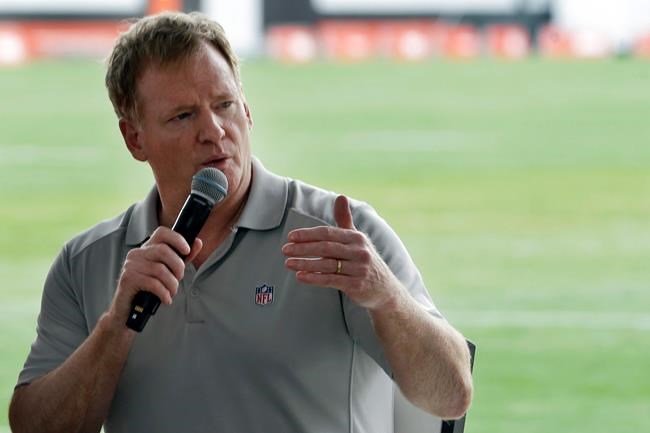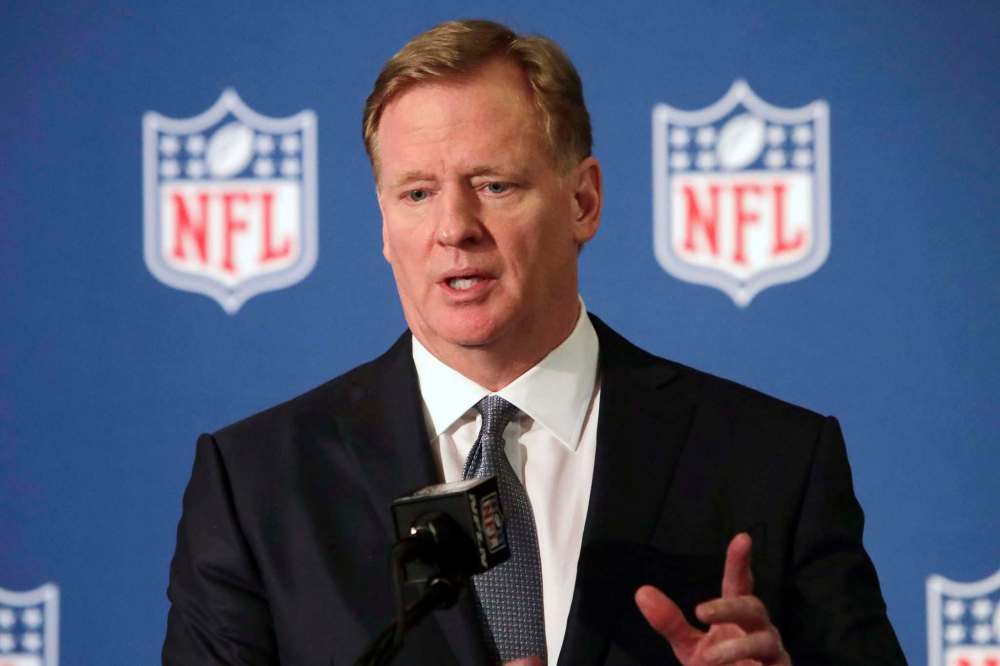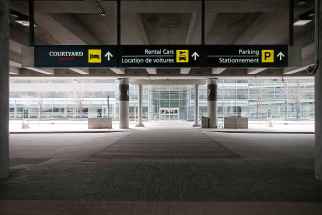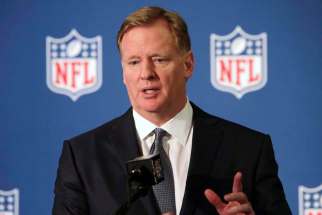NFL’s reversal suggests broader societal shift
Read this article for free:
or
Already have an account? Log in here »
To continue reading, please subscribe:
Monthly Digital Subscription
$0 for the first 4 weeks*
- Enjoy unlimited reading on winnipegfreepress.com
- Read the E-Edition, our digital replica newspaper
- Access News Break, our award-winning app
- Play interactive puzzles
*No charge for 4 weeks then price increases to the regular rate of $19.00 plus GST every four weeks. Offer available to new and qualified returning subscribers only. Cancel any time.
Monthly Digital Subscription
$4.75/week*
- Enjoy unlimited reading on winnipegfreepress.com
- Read the E-Edition, our digital replica newspaper
- Access News Break, our award-winning app
- Play interactive puzzles
*Billed as $19 plus GST every four weeks. Cancel any time.
To continue reading, please subscribe:
Add Free Press access to your Brandon Sun subscription for only an additional
$1 for the first 4 weeks*
*Your next subscription payment will increase by $1.00 and you will be charged $16.99 plus GST for four weeks. After four weeks, your payment will increase to $23.99 plus GST every four weeks.
Read unlimited articles for free today:
or
Already have an account? Log in here »
Hey there, time traveller!
This article was published 08/06/2020 (2017 days ago), so information in it may no longer be current.
The National Football League on Friday encouraged its players to speak out and peacefully protest against systematic oppression of African-Americans. It was an astonishing about-face for a huge entertainment conglomerate that had formerly come down hard on player protests against racism.
Coming in the midst of a national wave of demonstrations against police violence toward African-Americans, the NFL gesture suggests a shift in the political winds in the United States. If the NFL (and, presumably, its 32 wealthy team owners) is rethinking its views on racial injustice, some wider shift in the values of America’s white middle class may be afoot.
Goodell says NFL was wrong for not listening to players

Posted:
NEW YORK - NFL Commissioner Roger Goodell said the league was wrong for not listening to players fighting for racial equality and encouraged them to peacefully protest.
The majority of the large, physically powerful, highly-trained players in the NFL are people of colour. The league and its teams collect somewhere around $16 billion a year — the true financial figures are secret — by having these players assault each other with brutal violence for the amusement of huge audiences in the stands and on television.
Black NFL players spoke up collectively last week on social media with an emphatic demand for the league to condemn racial injustice and support players who do the same. The league complied on Friday with a statement from commissioner Roger Goodell, who stated that without black players there would be no National Football League.
Americans don’t necessarily look to the NFL for political leadership or for advice on race relations. There is, however, a good deal of history behind the NFL announcement on Friday which gives it deeper meaning.
In 2016, San Francisco 49ers quarterback Colin Kaepernick touched off national controversy by resolutely declining to stand for the U.S. national anthem before games. He and other players who joined him were protesting police violence toward African-Americans in Ferguson, Mo., and elsewhere.
U.S. President Donald Trump delighted his supporters at the time by telling the NFL to fire Mr. Kaepernick — which it effectively did by ensuring no team hired him for the following season. Mr. Kaepernick and the league later reached a confidential financial settlement, but the talented quarterback has not found employment with any NFL team.
Last Friday, the league quit following Mr. Trump’s advice and followed the advice of its own players. What exactly this means for those who take a knee during the national anthem remains to be seen.

America has seen previous waves of protest against racial injustice by police. One difference this time is that the protests have continued every day for two weeks — in many U.S. cities, and in Canada and Europe — since the May 25 killing of George Floyd by a Minneapolis police officer. Another difference is that the great majority of the demonstrators have behaved peacefully, despite reports of looting stores and burning buildings.
The NFL’s announcement, even if it is only symbolic, adds a third distinctive feature to the current uprising. The NFL makes its money by catering to the tastes of the American middle class. It lives in the mainstream of American life. When the NFL turns its back on the U.S. president and sides with its African-American players, something has changed in America.
Derek Chauvin, the former Minneapolis police officer charged with killing George Floyd, has started down the road that could lead a criminal proceeding. Police officers who kill in the U.S. and in Canada rarely come to trial, and jurors at the rare trials of police officers seldom convict them. Public protest and political action are likely to be more promising avenues to reform than criminal prosecution.






